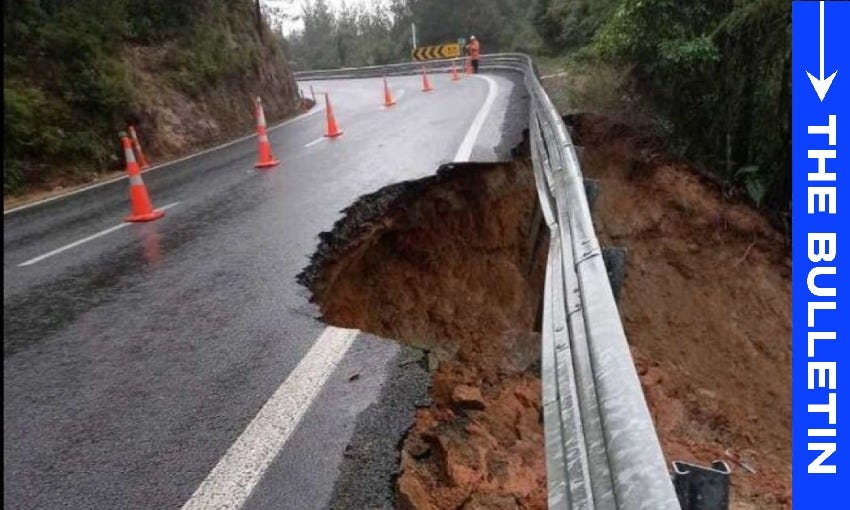The roads will be paved with consultants
As Coromandel residents ask questions about when vital roading repairs might be completed, government spending on consultants amid a shortage of engineers intersects with the answer
Mōrena and welcome to The Bulletin for Tuesday, March 7, by Anna Rawhiti-Connell. Presented in partnership with Z Energy.
In today’s edition: Auckland floods, Cyclone Gabrielle to cost insurance industry more than $1b; why Labour and National won’t commit to more free early childhood education; “tremendous courage” and “a sharp wit” — Georgina Beyer remembered; but first, prime minister defends spend on consultants citing investment in roading as prime example
State Highway 25 between Hikuai and Whangamatā (Photo: RNZ/Supplied Thames-Coromandel District Council)
Government transport plan to focus on reconstruction and resilience
Yesterday, the government walked back aspects of the transport plan I covered in yesterday’s Bulletin. The Herald reported that emissions reduction would be a top priority for the new plan yesterday morning but not long after, transport minister Michael Wood said that transport priorities signed off by cabinet last year “will change in the wake of Cyclone Gabrielle.” An “emergency-style” plan will now focus on the reconstruction of roads and bridges and building greater resilience in the transport network.
SH25A in the Coromandel could take more than a year to fix
Questions about when that reconstruction might be completed and who will undertake it, are top of mind for residents of the Coromandel. More rain closed SH25 over the weekend and SH25A remains closed with indications it could take more than a year to fix. Residents are asking for some certainty. SH25A is a main arterial route into the Coromandel and while one lane of SH25 has re-opened, it’s still closed to heavy commercial vehicles. Tairua Bus Company’s Steve Mosen suggests bringing “in Japanese or European engineers.”
Global shortage of engineers
It’s an understandable suggestion from Mosen whose bus company is taking “the long way round” as it transports 29 students to schools in the Coromandel every day. It does raise the issue of workforce capacity for all the repair and reconstruction we need to do though. In the initial assessment of State Highway 25A in February, Arezoo Rahimi, an expert in slope repair technology at the University of Auckland, indicated that some of the additional workforce capacity required to restore SH25A may have to be imported or developed quickly. There is a documented global shortage of engineers, including the kinds that design roads and undertake geo-technical assessments. New Zealand is no exception.
Engineering consulting firm recruiting for 35 roles with the word engineer in job title
In defending the government’s spending on consultants and contractors yesterday, prime minister Chris Hipkins cited Waka Kotahi as an example of a government department where that spending had increased because “that's the nature of the industry.” Waka Kotahi’s list of prequalified contractors includes WSP New Zealand, an engineering consulting firm. It is currently recruiting for 35 roles with the word engineer in the job listing, some of them geo-technical or structural engineers. It’s possible to argue that in an age where expertise is a commodity and we’re dealing with labour shortages, consultants and highly paid contractors could simply be market forces at work.
Quality, local journalism shouldn’t be a privilege for those who can afford it
The support of readers like yourself helps to ensure The Spinoff remains freely accessible to all, regardless of their ability to pay. If you value what we do and want to support us, please consider becoming a member, making a new contribution or encouraging your organisation to donate.
Insurers expect the Auckland floods and Cyclone Gabrielle to cost the industry more than $1b
Insurance Council head Tim Grafton says insurers have already paid out about $111m in claims relating to recent severe weather in the upper North Island. Insurers are expecting the Auckland floods and Cyclone Gabrielle to cost the industry more than $1b. Around 47,300 claims have been lodged for the Auckland floods and about 30,000 claims have been lodged so far from Cyclone Gabrielle. The number of claims from those two weather events are around twice the number lodged after the Kaikoura earthquake in 2016, said Grafton. WaterCare, the council-controlled organisation that manages the drinking water and wastewater services in Auckland, have additionally estimated that the cost of the recovery for its network will come in at over $250m.
Why Labour and National won’t commit to more free early childhood education
Some good analysis here from Stuff’s Glenn McConnell on why Labour and National won’t make more early childhood education (ECE) free. Spoiler: it’s cost. As McConnell writes, both parties’ strategies on ECE are in line with recent advice from officials at Treasury, who have warned that expanding fees-free schemes for early childhood could have unintended consequences. The government currently offers 20 hours of free education for children aged three and four. Michelle Duff delved into the reality of that “free” 20 hours last year. Treasury analysis suggests expanding fees free education to two-year-olds, and increasing it from 20 to 25 hours per week, would cost an extra $1.05b per year.
“Tremendous courage” and “a sharp wit”
The world’s first openly transgender mayor and MP Georgina Beyer died yesterday. Beyer was mayor of Carterton for five years and went on to beat broadcaster and National party candidate, Paul Henry, to win the Wairarapa seat for Labour in 1999. Those to pay tribute to Beyer include former prime minister Helen Clark. “Georgina showed tremendous courage in stepping into public life,” Clark said in a statement, adding that Beyer had “a sharp wit which was a great asset in the parliamentary debating chamber.” “She was always a favourite in Labour’s fundraising debates, including in my electorate. Even though her wit on those occasions was somewhat risqué, her lines always brought the house down,” she said. Recommended reading: this 2018 interview with Beyer with The Spinoff’s Alex Casey.
Click and collect
A reminder from Stewart Sowman-Lund to do the Census tonight if you haven’t already — it comes complete with more tips than I thought possible on how to make a night of it
Doctors, public health experts and schools calling for vapes to be pharmacy-only
Not a single fine handed out so far for smoking with kids in cars
Job losses begin at Auckland Council with more to come
Kaitaki ferry out for two weeks, Interislander disables Facebook comments
Got some feedback about The Bulletin, or anything in the news? Get in touch with me at thebulletin@thespinoff.co.nz.
If you liked what you read today, share The Bulletin with friends, family and colleagues.
Duncan Greive profiles a new online radio station for people who find The Platform too woke. Toby Manhire talks to Chlöe Swarbrick who confirms she will run again in Auckland Central and explains why she's campaigning against the mayor's proposed budget. Chris Schulz speaks to a Gisborne family who documented their harrowing Cyclone Gabrielle experience on film. Nadine Anne Hura is on the ground in Mangamuka, where resilience in times of crisis is a way of life. Tommy de Silva attends a wānanga between gang whānau and the government where having the courage to kōrero is a first step in healing intergenerational trauma.
Sporting snippets
Alice Soper with a review of the second week of Super Rugby Aupiki and an important question
The Black Ferns Sevens team take their fourth straight world series title after beating Australia 19-12 in the final in Vancouver
Sir Graham Henry and the “late middle-aged” group of Waiheke walkers raising money for Ukraine
Whatever happened to middle age?
“The characters in And Just Like That, the rebooted series of Sex and the City, were the same age (average 55) as the Golden Girls when they made their first outing in the mid-80s.”
Shocking comparison, although it was the Victor Meldrew reference in this great feature from Anita Chaudhuri on what’s happened to the concept of middle age, that nearly sent me to an early grave. One foot in, at the very least.










There is plenty of engineering knowledge available to help the rebuild right now around the country, the government just needs to utilise it. WSP and other first tier engineering firms are owned by overseas corporates and for some reason ($) are the governments preferred firms. The second tier made up of large NZ owned firms and the smaller firms below have the same skills and knowledge but miss out on work as they can't put in low enough bid to compete with the off shore cheap labour these large firms use, or compete with the concentrated experience they have from being the only ones the government gets to do that work.
Part of building back better should be building back smarter and sharing out the work and raising the expertise of all engineering firms in NZ.